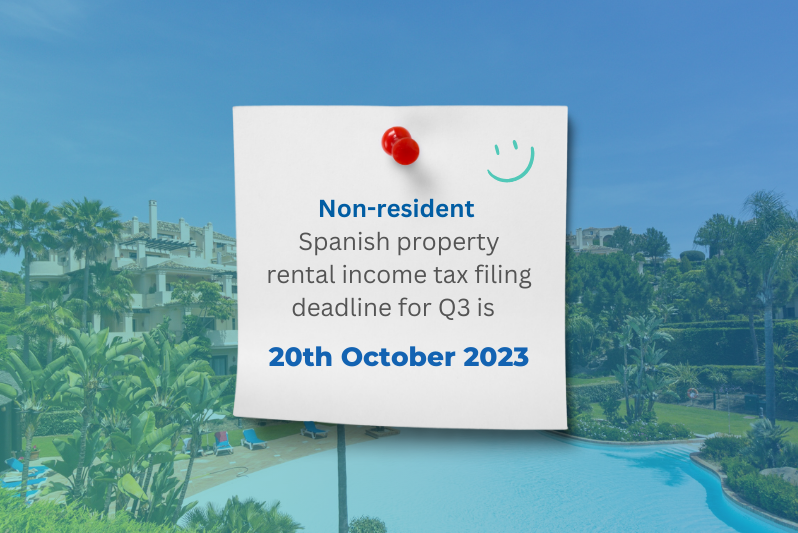The Spanish Rental Income Tax deadline is fast approaching!
September 8, 2023

As a non-resident, property owner in Spain, you are required to pay tax on any income you earn from renting out your property every quarter. This is done by filing Form 210 (Modelo 210).
The deadline for filing Quarter 3 taxes (for rental income earned in July, August, and September 2023) is 20th October 2023.
In this blog post, we'll be looking at this essential tax obligation and how you can best prepare yourself to submit your Modelo 210 this October.
Understanding Rental Income Tax in Spain for Non-Residents
When you rent out your property in Spain, the income you earn from those rentals is subject to taxation. As a non-resident property owner, this tax is known as non-resident rental income tax in Spain.
Quarterly Rental Income Tax
In Spain, rental income tax isn't an annual affair. Instead, it's a quarterly obligation. That means you'll need to file a tax declaration at the end of each quarter. These quarters align with April, July, October, and January of the following year, and payment is expected within the first 20 days of those months.
Why Is This Important?
Meeting this deadline is crucial when it comes to complying with Spanish tax regulations. Failing to file your rental income tax return on time can lead to expensive penalties and unnecessary added stress. However, on the flip side, timely compliance ensures a hassle-free tax journey in Spain and keeps you in good standing with the Spanish tax authorities.
What to Include in Your Q3/October Declaration
Your Q3 declaration should reflect the income you've earned from renting out your property during the third quarter, i.e., from July to September. It's essential to accurately report your earnings to calculate the tax liability correctly.
Deductible Expenses
Here's some good news! If you’re a resident of the European Union, Norway, Iceland or Liechtenstein, you can offset your rental income against these deductible expenses:
- Taxes, rates and local surcharges (Property Tax Bill (IBI) Rubbish Collection Bill (Basura)
- Personal third-party services such as administration, surveillance, porter services or similar
- Utilities like electricity, water, and gas
- Community fees
- Insurance premiums
- Costs relating to the drawing up of a rental lease and legal defence costs
- Advertising fees to promote your rental property
- Costs associated with home maintenance and repairs
Deducting these expenses may help in reducing your taxable income, ultimately lowering the amount of tax you owe in Spain, so it’s well worth looking into.
Rental Income Taxes for Mixed Rental Periods
If you, as a non-resident property owner in Spain, engage in partial property rentals, your tax filing process becomes a bit more intricate. In this scenario, you'll likely find yourself dealing with multiple Form 210 submissions to account for both your actual rental income and the ‘imputed income’, on days when the property was not rented out and was either empty or used for personal use.
To help clarify this, let's walk through an example featuring Paul, a non-resident property owner in Spain:
1. Modelo 210 for the First Quarter of 2023: Paul needs to report the rental income he earned from January to March. The deadline for submitting this Form 210 is the first 20 days of April 2023.
2. Modelo 210 for the Third Quarter of 2023: For the period of July to September, Paul must declare his rental income. This Modelo 210 form should be filed within the initial 20 days of October 2023.
3. Additional Modelo 210 Form: In addition to the above forms, Paul also must complete another Modelo 210 form. This one addresses the ‘imputed income’ for those days when the property was at his disposal but was not being rented out (even if it was empty). The deadline for submitting this third Modelo 210 for the 2023 tax year form falls at any point in 2024. In 2023, Paul will instead have to declare imputed income for the not rented days in 2022.
The Impact of Brexit on British Citizens
For those Spanish property owners who reside in the UK, it's important to be aware that Brexit has brought changes to the tax landscape. Any rental income generated from January 1, 2021, is now taxed at a rate of 24% on the gross income. Additionally, owners in the UK can no longer deduct expenses from their rental income.
For residents in the EU, Iceland, Liechtenstein and Norway, the tax rate on rental income remains at 19%, and they can still deduct expenses.
Submit your Rental Income Tax Return with IberianTax
Navigating rental income tax in Spain, especially as a non-resident, can be challenging. To ensure that you're meeting your tax obligations effectively, whilst optimising your financial situation, it's wise to consider professional advice or utilise specialised tax services like IberianTax.
Here at IberianTax, we’ve simplified the rental income tax process with our easy-to-use online tax filing service. By utilising IberianTax, you can submit your Modelo 210 to the Spanish tax authorities with ease, even if you have never submitted a Spanish tax return before!
Our team of Spanish tax experts are on hand to guide you through the tax return process smoothly and efficiently and offer support when it’s needed. We’ll even check through your return before submitting it to the authorities to ensure that all your information is correct.
Stay informed, stay compliant, and get the most out of your non-resident rental income in Spain with IberianTax.
rental income
spain
modelo 210
spanish taxes